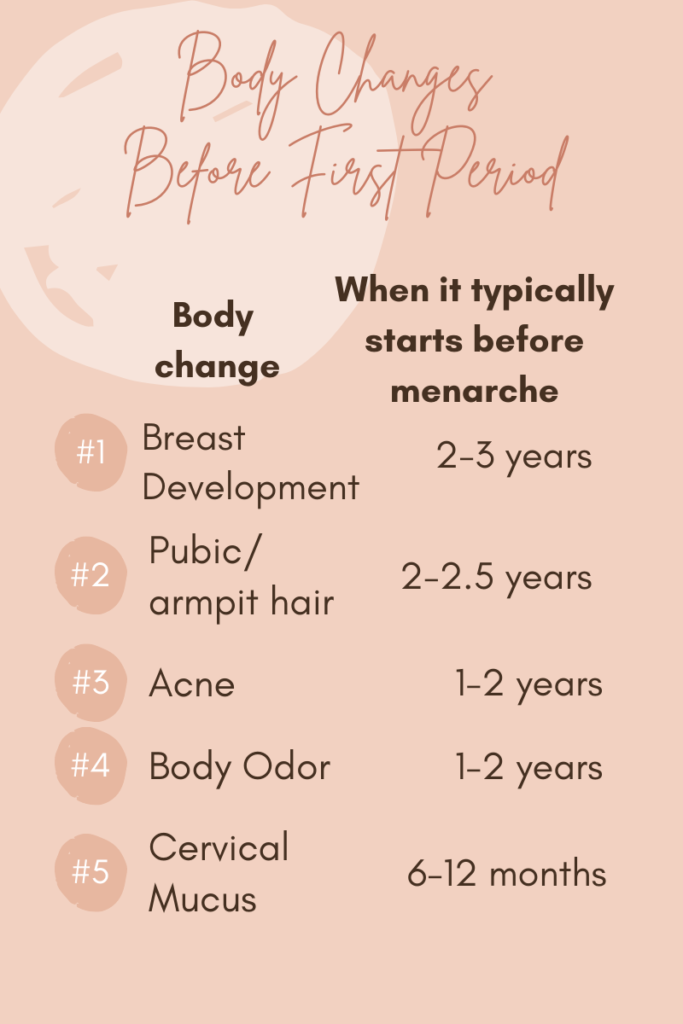Experts say that the average age of puberty onset and menarche (a girl’s first menstrual period) may be getting younger. A 2019 article in Psychology Today explains the research behind the phenomenon of precocious (early) puberty, while telling the heartbreaking story of Emma, a woman who had her first period at age 9.
As detailed by Psychology Today, Emma entered puberty before any of her friends, and even before her older sister, which placed her on a path of self-loathing and self-destruction that lasted for decades afterward. But not every “early bloomer” has to follow this path. With a positive attitude and clear communication from you, your daughter will be able to navigate these changes much better than she could ever hope to on her own.
The emotional turmoil of being an early bloomer
The American Academy of Pediatrics considers puberty to be early or “precocious” if it begins before age 8, but it’s safe to say that puberty is challenging for girls no matter what age it begins. Even the average girl, who now begins her transition into womanhood around age 10-11, and gets her first period around age 12, will still feel the emotional turmoil of a rapidly changing body, and exposure to new, endogenous sex hormones (especially estrogen and progesterone) that cause social uncertainty and a new sense of self.
It’s little wonder that when breasts begin to form, pubic and armpit hair grows, pimples erupt, and a girl begins to bleed unexpectedly at the age of 8 or 9 before any of her peers, that she may feel confused and betrayed by her body. At some point, these changes will be noticed by other kids her age, and their questions and teasing will only make it harder for her to cope. Without guidance from trusted adults, an 8- or 9-year-old may not yet have the knowledge, nor is she likely to have the coping skills that are essential to handling the potential turmoil of this transition.
The Psychology Today article notes the findings of developmental psychologist Jane Mendle, head of the adolescent transitions lab at Cornell University. She reports that girls who get their periods early are especially subject to distress, and more likely than others to suffer from panic attacks, suicidality, body dissatisfaction, substance abuse, and depression that extends into adulthood. They are also more likely to be singled out for sexual harassment at school.
A heartbreaking tale of precocious puberty: Emma’s story
Though Emma, the woman profiled in the Psychology Today article, seemed to have a normal and stable family and childhood, her early entrance into adulthood via precocious puberty caused her confusion and shame that deeply affected the course of her life. “‘I hated my body. I think it was all an escape,’ Emma says. She had sex for the first time when she was 11, with a boy her age. Thereafter it was mostly with boys a few years older.”
“I didn’t know what a period was when I got it, and no one sat down and talked to me about it. I was operating from a place of profound ignorance.”
Probably the biggest stressor for early blooming girls is that their young brains simply aren’t ready to handle pubertal changes, nor their peers’ responses to them. Suddenly, they may be dealing with adult feelings (like sexual urges, as Emma describes) and problems—but with a grade-school aged brain. The stress is doubled when no one has explained or prepared them for these big changes. I’ve heard many adult women recount the confusion they felt when their first period began without warning, and they had no idea why they were bleeding! Without proper knowledge and preparation for this event, their first instinct was to feel embarrassment, or fear that something was wrong with them.
Embarrassment is especially potent, because if the shame of bleeding between her legs prevents a girl from telling anyone about it, she may be left with only her dark feelings, ignorance, and increasingly dangerous coping mechanisms (Emma describes how she went from sex at a young age, to eating disorders, to drug use, and self-mutilation, all after beginning puberty and her period very early, with no guidance). With no one to tell her that her bleeding is normal, and to guide her through these body, mind, and emotional changes, the shame and isolation may be too much for a young girl. As with Emma, we see how comparisons to other girls her age without any outside perspective can inevitably lead an early bloomer down a heartbreakingly dark path of self-disgust and poor decisions.
Emma unequivocally credits both her precocious pubescence for her lifelong struggles with self-loathing, and her parents’ lack of guidance:
“Emma remembers acutely that her parents never explained anything to her; they just sent her for therapy.”
How to help your early bloomer
Knowing the struggles that early bloomers face, one can easily see that part of the solution is clear communication between parents and their children. Parents need to have a basic knowledge of early puberty signs to look for, and how to effectively prepare their daughter for those changes—whenever they may occur. Here are a few simple steps to helping your daughter (or any child in your life) feel more confident and less stressed when puberty begins at a young age.
Know the early signs of puberty.
Be aware of the body changes that occur leading up to a first period:
Look for these changes in your daughter.
If she’s not yet 8-years-old when you see signs of puberty, it may be worth seeing a doctor to discuss your concerns, get testing, and possibly pursue treatment. Regardless of the course of action you take, use your daughter’s body changes as age-appropriate opportunities to talk to her about what’s happening, and what changes are still to come. Make sure she knows that these are all normal changes for girls to go through, and that you’re there to help her through it all.
Help her prepare for her first period.
Once puberty has begun in your daughter, know that menarche is not far away. If she’s fairly young, she’ll need more mental preparation and encouragement than older girls who have had more time to learn about and mentally mature for periods. Young girls will need to know that periods are normal, healthy, and manageable with the right tools. Work together to make a period kit: a zippered bag with junior-sized pads, extra panties and leggings, a plastic bag for soiled clothes, wet wipes and anything else she may need when her period arrives. You can keep one to hold onto for her in your purse or car, and she can keep one in her backpack, cubby, or locker at school; that way she will know she is always prepared.
Be her constant guide, encouragement, and voice of reason.
When a girl begins puberty before her friends, she needs to have a safe person to talk to and guide her through these transitional years. Having someone who will give her honest advice, listen to her struggles, and not be afraid to talk about periods and other “body stuff” is invaluable. If you find an early bloomer under your wing, use these tools to help her along:
- Help her see the changes of puberty and periods as normal and good. Reaffirm for her that all of her female peers will experience the same things; she simply reached this milestone sooner. Give it a little time, and she won’t feel so different.
- Prepare her for what to say to friends and peers who question or tease her about her mature body. A good response to a female peer may be “I’m growing into a woman just like your body will, too.” Also be prepared to recognize signs of sexual abuse or harassment against your daughter. Constantly reiterate for her not only her dignity and self-worth, but that she should let you or another trusted adult know immediately if anyone (whether a peer, an older child, or an adult) makes her uncomfortable about her body—and that, should this happen, it is not her fault in any way, shape, or form.
- Help her understand what a menstrual cycle is, the hormones that control it, and i’s importance for her health as a blossoming woman. The more she understands about her female body, the more she’ll appreciate and care for it. Learning to chart her cycle is a wonderful way to teach her all of this with the added benefit that she’ll be able to predict when her period will arrive each month, so she won’t be caught by surprise. Understanding her body better gives her a sense of control and more confidence. The younger she is, the more you can help her by holding her hand throughout the process—consider charting her cycle together at the end of the day.
- Make it an open, ongoing conversation. The more you talk about periods and share your own experiences with puberty, the more normal your daughter will feel, and the more comfortable she’ll be coming to you with her concerns. Be sure to ask her what her friends say, what her biggest struggles are, and how she’s coping.
- Make it positive and fun. Getting a first period is an important milestone and can be celebrated! Even if early puberty isn’t something you would have wished for your daughter, stay positive: Kids are emotional barometers, and your attitude about her body changes will influence her attitude.
- Create a support network. Involve teachers who can help at school, other female family members who can offer encouragement, or find other moms and daughters in a similar situation to be mutually supportive.
Though entering puberty early is undoubtedly challenging for girls, it doesn’t have to be a negative experience. When a girl is going through big physical and emotional changes, silence and ignorance from those closest to her (especially her parents) will breed fear, shame, and poor decisions—as we see through the heartbreaking example of Emma’s story. Conversely, when a girl is educated about her body, and how and why it’s changing, and is encouraged to talk about it, she will feel more confident and prepared to navigate these changes—whenever they occur.
Additional Reading:
Signs that your daughter will be getting her first period soon—and how to prepare her for it
Should you put your teenage daughter on hormonal birth control?
Empowering Teenage Girls to Know Their Bodies: A conversation with Emily Sederstrand
Busting the 4 Biggest Myths about Teens and Fertility Education
Why I’m teaching my daughters how to chart their menstrual cycles
Teaching your daughter about periods: Why you don’t need to give her “the talk”








